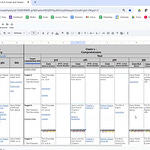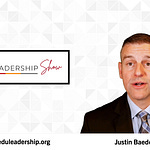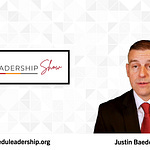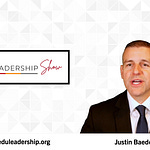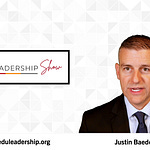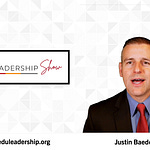Have a story, photos, or videos to share of animals on campus? Leave a comment or email me at justin@principalcenter.com
Nason Lollar: The Peter Principle Is A Dangerous Myth
Meghan O’Rourke: I Teach Creative Writing. This Is What A.I. Is Doing to Students
Get a free subscription to The Marshall Memo when you join the Instructional Leadership Association
Principal Center Radio: Marc-Oliver Gewaltig—Thesify.ai: Scholarly Writing in the Age of A.I.
Full Transcript:
(00:00):
Eduleadership show for August 11th, 2025. I'm your host, Justin Baeder, and in this episode, we'll talk about a Yale poetry professor who tried chat GPT and shared some of her reflections in the New York Times. We'll talk about "Ride your Horse to School Day and we'll talk about promoting people to their level of incompetence. Let's get to it. First up, you may have seen photos like this making the rounds on the internet. There's an old urban legend in Montana that a state law that is still on the books requires school principles to care for any horses that students may ride to school. And there's been some investigation. I don't think there actually is a state law that says that, but it becomes a fun senior prank every year in a number of Montana schools and perhaps other places. And I just think that's a ton of fun.
(00:47):
The principals are always good sports about it when students ride their horses to school, but we're going to have a recurring segment on this show called Animals on Campus, and I would love to know what your experiences with animals on campus have been, whether those are animals that students bring, like horses or perhaps a smuggled in kitten or puppy. I have some personal stories that I'll be sharing and I would love to hear some of your stories. I've got one lined up for tomorrow and can't wait to share some of those with you, but send me your photos and videos of animals on campus. And if you don't have photos and videos, that's okay to send me your stories and I'll share them here on the Eduleadership show. Next up, I wanted to share a new blog post by my friend Nason Loller, who is the author of 5 Principles of Educator Professionalism: Rebuilding Trust in Schools.
(01:33):
Now, Nason joined me a few months ago to talk about the book on Principal Center Radio, and we'll put a link in the show notes to that interview. Nathan's a very thoughtful middle school principal and he has a new blog post called The Peter Principle is a dangerous myth, and it's all about growing people, especially when they're in new leadership roles. Now, if you're not familiar with the Peter Principle, this goes back to I think the 1960s. There's a book called the Peter Principle, and the idea is that people rise to their level of incompetence. People rise to the level of their incompetence. And what you have to know about the Peter principle is that it's satire. It is a management satire book. As Nason points out, I'm not sure how many books you've read in the management satire genre, I've read maybe one or two, but it is kind of a different animal.
(02:20):
And what you have to understand here is that they're not recommending any particular course of action in this phrase. They're just making an observation that often what happens in organizations is that people are good at their jobs, and those people are naturally the very people we consider for promotion. So that when we have a vacancy, we have a leadership role that we need to fill. We think of people who are on the rise, who have demonstrated competence in what they're doing and are ready for more responsibility. The observation here though, I think is often correct, that when people get put into a new role that requires new skills, they don't come in with those skills. Many of those skills are developed on the job, and we can't always hire for those skills. We can't screen in advance and say, okay, who has these skills? We're only going to consider people who have all of the skills that it will take to do this job successfully.
(03:06):
So often people do end up in jobs that are challenging for them that they have to learn, that they have to develop new skills and they make mistakes. But I think what Nason points out so well in his critique of our popular thinking about the Peter principle is that learning is always necessary. And he says, this is one of my favorite quotes from his blog post, competent people struggle because they're learning. We should not see an instance of the Peter principle as proof that we hired an incompetent person. If we're giving someone more responsibility, that should be challenging to them, that should require them to grow, and that growth and that learning are good things. So read the article. We'll put the link in the show notes over on Nason’s blog. I think it's very thoughtful and I think it really reinforces for me the importance of believing in people's ability to grow, believing in our own ability to grow.
(03:57):
It also for me is a good reminder that there is value in growing your own talent and promoting people, and not just hiring from the outside anytime you have a senior vacancy, but growing people and believing in people and being patient with people while they learn what they need to succeed in a job. And I think this idea that we're always going to be able to hire people who already have everything they need just doesn't hold up very well because those people aren't very common and we can't usually afford them. They're hard to come by in terms of experienced leaders. So often we are growing our own people, and that's a good thing. And you should read Nason’s article if you are interested in that topic. Now, a question I wanted to ask you is have you seen people get promoted too fast? Because what NA is not doing in his article here is suggesting that we should just promote people fresh out of college, give 'em a promotion, give 'em a promotion, one after another, and soon our superintendents are 22 years old.
(04:48):
Obviously, that is going to be a problem if we are promoting people too quickly and there is a learning curve to any job, but there's also danger in promoting people too quickly. There should be some developmental processes. We should have maybe some minimum years of experience. We should have some indicators that someone is ready for more responsibility, and I would love to have your thoughts on what those indicators are and maybe what has happened when you've seen people get promoted too quickly.
(05:15):
Next up, I wanted to share a New York Times essay, a guest opinion essay that I thought was one of the best takes I've ever seen on artificial intelligence. And it's by Megan O'Rourke, who is the executive editor of the Yale Review and a professor of creative writing at Yale University. So someone who knows a bit about writing. And the headline is, I teach creative writing, and this is what AI is doing to students.
(05:39):
And it's a really interesting article because she shares how she ended up using chat GPT very successfully to kind of take on some of the mental load of life, like help me plan meals with these ingredients and that my kids will like, and all the little things that we have to think about so that she could focus more on her professional as a poet, as a creative writer, as a teacher of creative writing, there are things that we can offload to chat GPT, and we're happy to have them carry that load, right? I still use a shopping cart at the grocery store and I lift weights. I don't have to carry my own groceries all of the time. And I think we can all look for opportunities like that to allow AI to carry some of the load, but we have to be very careful.
(06:19):
And this is a very, very insightful essay on the dangers of allowing our students to rely too much on ai. And she cites a study by the MIT media lab called Your Brain on Chat, GPT accumulation of what they call cognitive debt when using an AI assistant for essay writing tasks. And you can click through to read the study itself from the New York Times article. But basically in this study, what they did was they had students write essays on three different occasions. So the same students got to experience all three conditions using AI, using only a search engine and using neither one and just relying on their own brain. Now, I want to ask you to stop and think for a second. What do you think happened? What do you think were some of the findings among these different conditions of having students write an essay with and without search engine and ai?
(07:08):
Well, not very surprisingly, they found that using AI and then to a lesser extent using a search engine reduced brain activity, they actually hooked people up to machines and measured their brain activity. It reduced recall their knowledge of what they had written, and it reduced their ownership of their work. And I think when it comes to the work that students are doing in the classroom, we want students to be engaged. We want that brain activity. We want them to remember it because often we're having students do writing not for the sake of the writing itself, but to learn the content and to engage with the content in a deeper way so that it sticks and they understand it. And we want students to take ownership of their ideas, especially with something like creative writing. So all of these to me, seem bad, and I think we need to be very, very careful about using ai.
(07:58):
So here's a quote from the article. Students often turn to AI only for researching, outlining and proofreading. The problem is the moment you use it, the boundary between tool and collaborator, even author, begins to blur. First, students might ask it to summarize A PDF. They didn't read then tentatively to help them outline, say an essay on Nietzsche, the bot does this and asks if you'd like, I can help you fill this in with specific passages, transitions, or even draft the opening paragraphs. So as she points out, AI can be helpful with what you ask it to do, but it will also offer to go beyond what you ask it to do. And there's a constant temptation there for students. They're perpetually going to be tempted to offload their work that is supposed to result in them becoming educated to ai. So what can we as educators do about this?
(08:50):
This is going to be an ongoing conversation for years, I'm sure as the technology continues to mature and become a of our society. But one very simple thing that I've heard a number of people recommend is to simply make students show their work. And you could do that with a pencil and paper in the classroom. If you're having students work with no technology at all, that's totally fine. Have them use note cards, have them use a pencil and paper and watch them do their work so that they didn't have AI do it. If you do want to use more modern tools, a very simple one is revision history. If you have students write in Google Docs, let them know, Hey, I want you to have all of your work done in Google Docs. Don't copy and paste from anywhere else. Actually type it out in Google Docs.
(09:29):
You will be able to see if they did that by checking the version history. So if you go to file version history, you'll see an option that says, see version history. And you can watch them type word by word their entire essay. So it'll be obvious if they copy and pasted from ai. And of course, there are lots of other tricks, and I think the article does a good job of running down some of the drag that it is to try to catch students cheating with ai. I don't think this is mostly about cheating. I think it is primarily about learning and making sure that we're not undermining the goals of the learning by using tools that are supposedly there to help. And I'm reminded of a conversation that I had on Principal Center Radio a while back with Mark Oliver Alig, who is a scientist and researcher, and one of the founders of Sify, a scholarly writing platform for the age of ai.
(10:21):
And he said, essentially, you wouldn't go to the gym and use a forklift to lift the weights. There would be no point to that. And similarly, you wouldn't want students to write an essay for their own development to help them learn, to help them grow as writers, and then use AI to do it and not benefit from that work because they didn't do the work themselves. So we've got to really be thoughtful about the assignments that we give, about the tasks that we give and keep the focus on learning. So this was a great article in the New York Times, again, it was called I Teach Creative Writing, and this is what AI is doing to students. And I would encourage you to check it out because she really does share some great ways that she used AI productively, but also some things that were kind of a unnerving and about teaching it to write in her voice and kind of the dissatisfaction that came from seeing that writing come from her.
(11:10):
So there's a lot there. There's a lot of good stuff. And I want to give credit to my source for finding that article. I did not come across this in the New York Times. I came across it in the Marshall Memo, which is Kim Marshall's weekly roundup of important ideas and research in K 12 education. So what Kim does every week is he reads a stack of newspapers and magazines and journals, and he picks out the best articles and he summarizes them. And I think these summaries are so good that I not only read them every week, he's been doing this for like 20 years now. I not only read them every week, but I buy a subscription for all of our Instructional Leadership Association members. So I highly encourage you to go to marshall memo.com or you can go to Principal Center dot com slash join if you want everything we offer in the instructional leadership. And you will get a Marshall Memo subscription so that you can keep up with the latest news and education research. And I'll try to share some of my favorites here on the Eduleadership Show as well. That's it for this episode. I'm Justin Baeder, and you can subscribe and read the transcript and find all of the links that I mentioned in this show at eduleadership.org.




